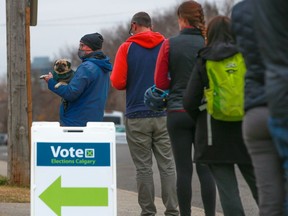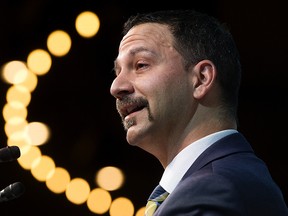AB Munis is advocating for a reduction on campaign donation limits and tightened financial disclosure rules for candidates.

Article content
The president of the association that represents more than 260 of Alberta’s cities, towns and villages is continuing to beat the drum that party politics would be “a bad idea” at the municipal level.
At a news conference Tuesday, Tyler Gandam, president of AB Munis, outlined four recommendations for the Alberta government to increase transparency at the most local level of government.
Advertisement 2
Article content
Article content
The suggestions include cutting personal campaign donation limits to $2,500 per candidate and tightening financial rules to require candidates to file pre-election disclosure statements.
“A reduction in contribution limits would go a long way toward creating a more level playing field and ensuring large donors do not drown out the voices of grassroots Albertans,” said Gandam, who is also the mayor of Wetaskiwin.
Limits on campaign contributions should also apply to third parties, he added, so that political action committees don’t have an advantage over individual candidates.
“Voters should know who is donating money to candidates or indirectly supporting them through advertising,” he said.
The association is also advocating for a requirement that candidates must confirm on their nomination forms that they understand their role as a council member, as set out in the Municipal Government Act.
Recommended from Editorial
Article content
Advertisement 3
Article content
Gandam also said the Alberta government should make educational resources on this matter available to prospective candidates.
Tuesday’s news conference was in response to the province’s intent to introduce legislation allowing for parties to field candidates in municipal elections.
While some Canadian cities — such as Montreal and Vancouver — have entrenched a form of localized party politics, Alberta has maintained a municipal governance system where council candidates run and are elected as independents.
Premier Danielle Smith has expressed support for the idea of municipal party politics, particularly for the province’s largest cities. She argued in February that Edmonton and Calgary’s councils are already partisan, and members often introduce motions they did not campaign on.

But Gandam has long claimed there is little public support for municipal party politics, citing surveys done by AB Munis and the Alberta government. He reiterated Tuesday that a provincial survey last fall showed more than 70 per cent of respondents opposed the idea.
A party-based system would likely encourage councillors to stick to their party’s stance, Gandam said, rather than listen to their constituents and consider their community’s welfare as a whole.
Advertisement 4
Article content
“We believe a party-based system would contribute to a more adversarial and combative environment,” he said. “It seems likely that divisions on municipal councils along party lines will enflame existing divisions among groups within the communities, and even between neighbouring municipalities.”
Most municipal councils, Gandam argued, are busy contending with non-partisan challenges, such as improvements to snow-clearing, wastewater treatment, road repair and public transit services. The status quo encourages municipal councils to collaborate and compromise to find consensus on a particular issue, he argued.
“The current non-partisan system creates an environment in which councillors are encouraged to listen to one another, consider alternative views, weigh the pros and cons, seek additional information and debate issues before voting on them,” Gandam said.
Nevertheless, the province appears poised to introduce legislation as early as this spring.
Last month, Municipal Affairs Minister Ric McIver told reporters the government is considering amendments to the Local Authorities Election Act to allow candidates to list party affiliation alongside their name on ballots.
Advertisement 5
Article content
“This isn’t a takeover of municipalities by our political party or any other one,” McIver, who previously served as a councillor in Calgary, said at the time. “No one will be allowed to be affiliated with a provincial or federal party if they decide to run in a municipal election as a party.”
In Calgary, a grassroots group of political activists dubbed Project YYC emerged in March, with the objective of helping get a “common sense” conservative mayor and council elected in 2025.
Groups such as Project YYC are examples of the democratic process in action, Gandam argued, rather than evidence of an emerging political party.
“I think that while anybody can show allegiance to any political party right now, the introduction of political parties at the local level . . . doesn’t change or improve the quality of life for residents in that municipality,” he said.
— With files from Matthew Black, Postmedia
Article content






